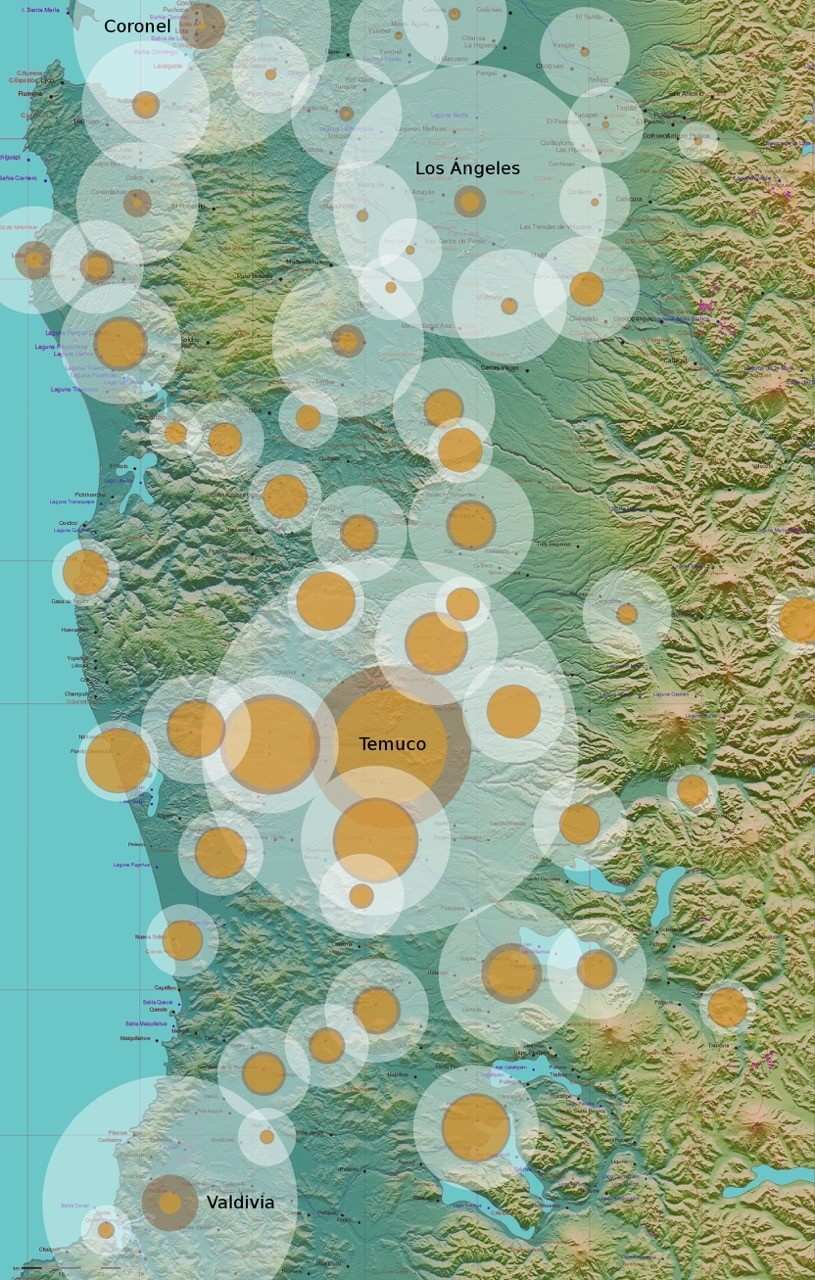
Get to Know the Mapudungun language and Mapuche culture
The Mapudungun language, sometimes spelt Mapuzugun or Mapudungu, is spoken by the Mapuche people in Chile and west central Argentina.
The word Mapudungun comes from mapu (land) and dungun (speak, speech), whilst Mapuche comes from mapu (land) and che (people).
There are thought to be several hundred thousands speakers of the Mapudungun language.
Why learn the Mapudungun language?
Santiago, Chile
Photo by Francisco Kemeny on Unsplash
Speakers :
260,000
Where :
Chile, Argentina
Dialects :
North, Central, South-Central, South
Cover Image
Parque Nacional Conguillio, Temuco, Chile
Photo by Franz Nawrath on Unsplash
Map
By Heinrich Puschmann - Own work, using background maps produced by RAVL with Generic Mapping Tools (http://gmt.soest.hawaii.edu/), CC BY-SA 3.0, https://commons.wikimedia.org/w/index.php?curid=39305754
Resources for learning the Mapudungun language
-

-

-

Videos
Victor speaking Mapudungun - Wikitongues
Taller de Mapuzugun : Online Nivel Básico (Playlist) - Talleres de Mapuzugun
Taller de Mapuzugun : Online Nivel Intermedio (Playlist) - Talleres de Mapuzugun
Taller de Mapuzugun : Online Nivel Avanzado (Playlist) - Talleres de Mapuzugun
Curso Mapuzugun : Nivel Básico (Playlist) - Talleres de Mapuzugun
Curso Mapuzugun : Nivel Intermedio (Playlist) - Talleres de Mapuzugun
Curso Mapuzugun : Nivel Avanzado (Playlist) - Talleres de Mapuzugun
Pronunciación de Mapuzugun (Playlist) - Kimeltuwe, Materiales de Mapudungun
Videos de Mapudungun (Playlist) - Kimeltuwe, Materiales de Mapudungun
Reseñas de libros en Mapuzugun (Playlist) - Kimeltuwe, Materiales de Mapudungun
Karaoke en Mapuzungun (Playlist) - Kimeltuwe, Materiales de Mapudungun
Clase de Mapudungun (Playlist) - Mocen
Curso de Mapudungun #1 : Vocabulario Básico 1 - Amulzugun
Clase n°1 de mapudungun para niñxs - Escuelita la tribu
Una aplicación para aprender Mapudungun - MEDIA UC
Rapeando Aprendo Mapudungun - Luanko
¿Malas Palabras en Mapudungun? - Culto Chilensis
Kuyfi Kimun | Conocimiento antiguo | Cultura Mapuche (Playlist) - CNTV Infantil
-

Films
-

Books
Diccionario de la Lengua Mapuche : Mapudungun - Español - English
by Maria Catrileo
Chi Pichi Ülmen (The Little Prince in Mapudungun)
by Antoine de Saint-Exupéry
-

Podcasts and Radio
-

Articles
-

-

-
All of the resources mentioned on the website and in the How to Learn Languages guides are resources I believe in. They're resources I've either found useful learning languages, or have researched for the How to Learn Languages website and guides. The overwhelming majority of these resources are not affiliate links.
I only agree to affiliate links for resources I genuinely believe in. By having affiliate links for resources I believe in, I hope this can reduce the cost of paid resources for you, whilst also helping me to continue working on books, videos, documentaries, and How to Learn Languages.
This link to the Ling app is an affiliate link. I recommend Ling because they provide a fun and convenient way to start learning languages that are less frequently covered online. If you sign up to one of Ling’s paid plans using this link, I’ll earn a commission - at no extra cost to you.
If you buy certain books linked in How to Learn Languages guides, on my websites, or social media channels, I’ll earn a commission - at no extra cost to you - from Bookshop.org, whose fees support independent bookshops. Any books that aren’t available from Bookshop.org have been linked to their relevant page on Goodreads.
This italki link is also an affiliate link. If you pay for your first lesson on italki using this link, you’ll receive $10 italki credits, and I’ll earn a commission - at no extra cost to you.
Although the series aims to show anyone how to learn languages for free, it’s true that paid resources often help save time - both in terms of preparation and organisation. By having affiliate links for resources I believe in, I hope this can reduce the cost of paid resources for you, whilst also helping to make the development of more How to Learn Languages guides possible.
Regardless of whether you use the affiliate links, thank you so much for your support. I really appreciate it.

How to Learn Spanish eBook
The majority of the resources available for learning Mapudungun are in Spanish.
One of the great things about learning Spanish is that it makes learning languages like Mapudungun easier - because Spanish is the majority language in Chile and Argentina, and most of the resources are therefore in Spanish.
If you're interested in learning Spanish, How to Learn Spanish will guide you through the process in a fast and fun way.
Download the Ling app and start learning languages less frequently covered online!
★★★★★
*Affiliate link : If you sign up for Ling Pro, I’ll earn a commission, at no extra cost to you. Ling is a resource I believe in!
Contact
Do you make videos or resources for learning a specific language? Feel free to get in touch so I can add links to your work on the relevant Get to Know page for that language, or in the relevant How to Learn Languages guide.
As well as helping people to learn languages, encouraging linguistic diversity, and raising awareness for the rights of indigenous peoples, I hope How to Learn Languages will also help to grow the audiences of anyone creating resources for learning languages.



